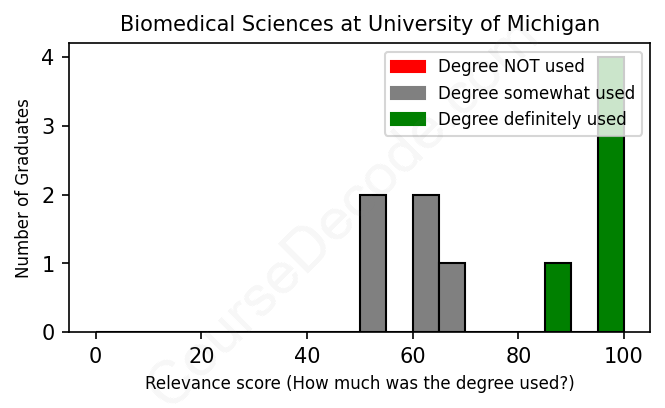
First, some facts. Of the Biomedical Sciences graduates from University of Michigan we've analyzed , here's how many have used (or NOT used) their degree in their career:

These are estimates based on AI analysis of 10 LinkedIn profiles (see below).
The verdict? Above average. Overall, with an average relevance score of 77%, Biomedical Sciences graduates from University of Michigan have a higher likelihood (+10%) of finding work in this field compared to the average graduate across all fields:
And for comparison, here's the chart for all profiles we've looked at across all degrees.
Also, after graduating, 40% of these graduates have pursued further education other than another Bachelor's degree (such as a Masters degree or other), compared to the average across all profiles of 35%. This suggests you may need more than just a Bachelors degree to be competitive as a Biomedical Sciences graduate.
See the details:
|
Relevance score: 50% We think this person has gone into a career only somewhat relevant to their degree. We think this person has gone into a career only somewhat relevant to their degree.
DEGREE INFOGraduated in 2022 from University of Michigan with a Bachelor of Science in Engineering- BSE in Biomedical Sciences. No other secondary education since. JOB HISTORY SINCE GRADUATIONTechnical Solutions Engineer Epic Jun 2022 - Present ABOUTNo information provided. |
The top 10 most common jobs done by the graduates we've analyzed (ranked most common to least) are:
When looking at the jobs people from the University of Michigan with a degree in Biomedical Sciences have taken on, a lot of them are centered around research and medical fields, which makes sense given their educational background. Positions like Postdoctoral Researchers, Orthopaedic Surgery Residents, and Research Associates are all highly relevant and directly utilize the skills acquired from their studies. These roles show that many graduates are diving headfirst into the scientific and medical world, using their knowledge to contribute to real-world applications and advancements.
However, it's interesting to note that not every job aligns perfectly with their degree. Some have taken on roles like Ski Patrol or serving as an ESL Teacher, which are definitely outside the biomedical realm. While these positions might offer valuable experiences, they don't really tap into the specific skill set that comes from a Biomedical Sciences degree. Overall, it seems that while many graduates are finding relevant and impactful positions in research and healthcare, there’s also a notable number who venture into unrelated fields, either temporarily or as a career change. That mix shows the diversity of opportunities out there, even if they don't all connect directly to their major.
Here is a visual representation of the most common words in job titles for Biomedical Sciences graduates (this is across all Biomedical Sciences graduates we've analyzed, not just those who went to University of Michigan):

Graduates from the University of Michigan with a degree in Biomedical Sciences seem to have a pretty diverse set of career paths after they finish school. Right out of college, many of them land jobs in research roles or continue their education in graduate programs. For example, some graduates ended up as postdoctoral researchers or research associates, which indicates that a good number of them are sticking with the science and research fields. Others have taken on roles in medicine, like orthopedic surgery residency, which shows they’re pursuing advanced clinical careers. There’s also evidence of graduates working in pharmaceutical companies, like Eli Lilly and GSK, which is a solid sign that they’re finding jobs that are closely tied to their studies.
Fast forward a few years, and you can see that many of these graduates are holding positions that clearly leverage their Biomedical Sciences background. However, it’s also notable that a few have ventured into seemingly unrelated areas, like instructional roles or volunteer positions. Nonetheless, it looks like the overall trend is leaning positively towards relevant careers in research, medicine, and pharmaceuticals, especially as many of them seem to transition into roles that require specialized knowledge after spending a few years in the field. So, overall, while some may take a more winding path, there are plenty who are finding great opportunities related to Biomedical Sciences, which is encouraging for anyone considering this major!
Hey! So, a Bachelor’s degree in Biomedical Sciences can be pretty challenging, especially at a competitive school like the University of Michigan. You're diving into a mix of subjects like biology, chemistry, and even some physics and math, so it’s definitely not a walk in the park. There’s a lot of rigorous coursework and lab work, which can get intense. That said, if you're super passionate about the sciences and are willing to put in the effort, you can totally manage it! Just make sure you're ready for some late nights studying and a fair amount of juggling different subjects.
Most commonly, in the LinkedIn profiles we've looked at, it takes people 4 years to finish a Bachelor degree in Biomedical Sciences.
So, looking at the job paths of these Biomedical Sciences grads from the University of Michigan, it seems like they’re mostly on the right track, especially if they're aiming for careers in healthcare and research. A couple of them are jumping into big roles in prestigious labs and companies, which can definitely be lucrative, like being an Associate Scientist at GSK or an Orthopaedic Surgery Resident—those positions tend to pay pretty well as you gain experience. On the other hand, some have taken internships or more entry-level jobs, which might not pay as much initially. Overall, while they're likely not raking in the big bucks just yet, especially in the early stages of their careers, many of them are building solid foundations that could lead to decent salaries down the line.
Here is a visual representation of the most common words seen in the "about" section of LinkedIn profiles who have a Bachelor degree in Biomedical Sciences (this is across all Biomedical Sciences graduates we've analyzed, not just those who went to University of Michigan). This may or may not be useful:

Here are all colleges offering a Bachelor degree in Biomedical Sciences (ordered by the average relevance score of their Biomedical Sciences graduates, best to worst) where we have analyzed at least 10 of their graduates:
| College | Score | Count |
|---|---|---|
 Western Michigan University Western Michigan University
|
81 | 17 |
 Marquette University Marquette University
|
78 | 29 |
 University of Michigan University of Michigan
|
77 | 10 |
 Colorado State University Colorado State University
|
77 | 19 |
 University at Buffalo University at Buffalo
|
75 | 18 |
 California Polytechnic State University-San Luis Obispo California Polytechnic State University-San Luis Obispo
|
74 | 13 |
 University of Connecticut University of Connecticut
|
74 | 15 |
 Texas A&M University Texas A&M University
|
73 | 59 |
 Auburn University Auburn University
|
71 | 26 |
 Northern Arizona University Northern Arizona University
|
71 | 15 |
 Rensselaer Polytechnic Institute Rensselaer Polytechnic Institute
|
70 | 10 |
 University of Central Florida University of Central Florida
|
69 | 26 |
 University of South Florida University of South Florida
|
68 | 48 |
 Georgia Institute of Technology Georgia Institute of Technology
|
67 | 41 |
 The Ohio State University The Ohio State University
|
64 | 14 |
 Rochester Institute of Technology Rochester Institute of Technology
|
64 | 12 |
 Case Western Reserve University Case Western Reserve University
|
63 | 12 |
 Grand Valley State University Grand Valley State University
|
59 | 35 |
 Arizona State University Arizona State University
|
58 | 12 |